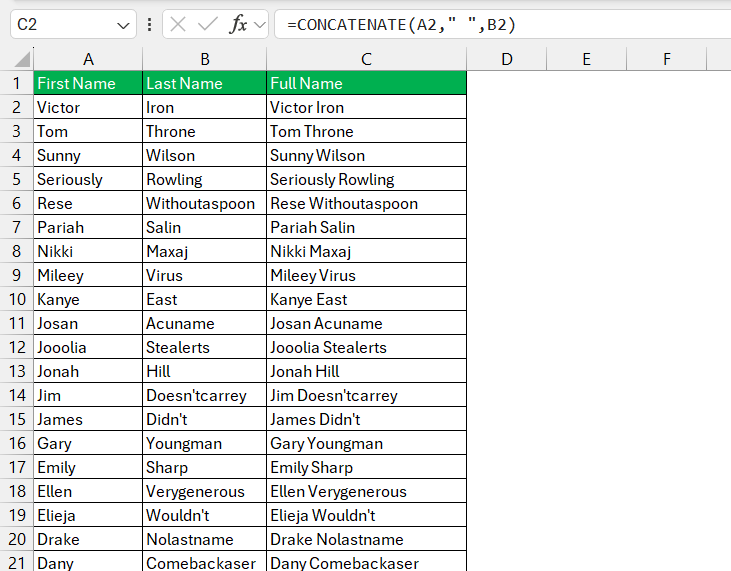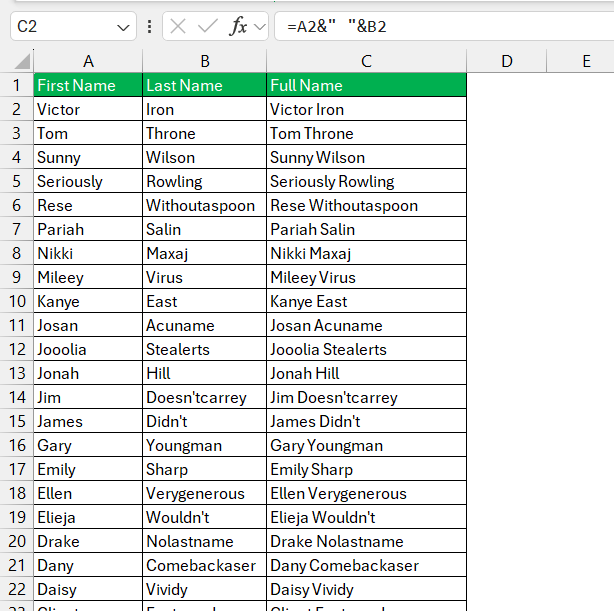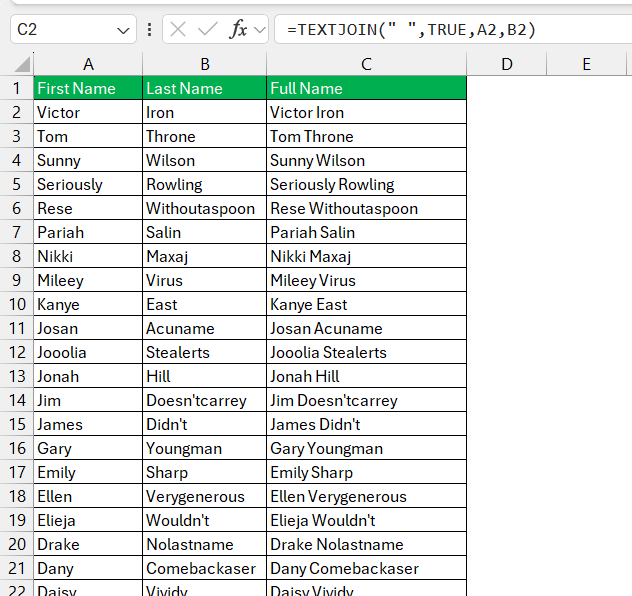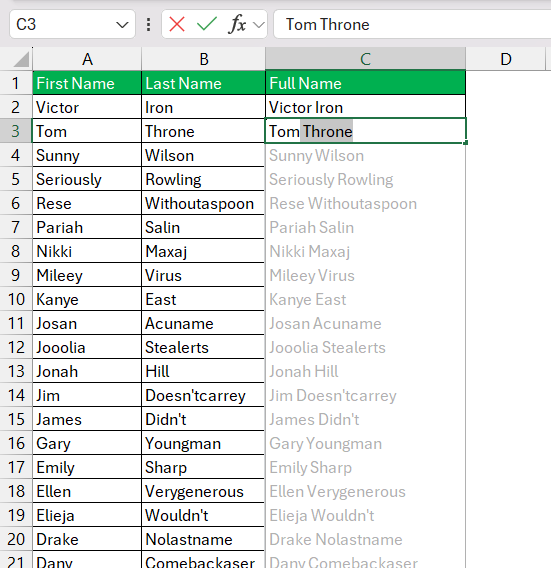Combining names in Excel is something I often need to do, and it really helps streamline my data management and reporting. Whether I’m merging first and last names or combining multiple columns of data, Excel has several methods that make this task efficient. Here’s a detailed guide on how to combine names in Excel using various techniques.
Key Takeaways:
- Combining names in Excel streamlines data management and reporting.
- Using functions like CONCATENATE, CONCAT, and TEXTJOIN helps efficiently merge names.
- The ampersand (&) operator is a simple and flexible tool for combining text.
- Flash Fill can automatically combine names based on a pattern I set.
- Excel allows for customization in delimiters and merging names from different sheets or non-adjacent cells.
Table of Contents
Introduction to Name Merging in Excel
The Basics of Combining First and Last Names
Excel is an incredibly powerful tool when it comes to managing and organizing data, including name lists. Combining first and last names may look simple at the outset, but it is an essential skill in data management. I have found that the ability to fuse names seamlessly comes in handy, whether I’m consolidating contact lists, organizing employee information, or preparing mailing labels.
First, let’s focus on the basics. The task of merging names in Excel usually involves the use of formulas or in-built functions that allow one to join separate text strings into a single cell. While the result may look straightforward – a full name from individual cells – understanding the methods to achieve this effectively sets the foundation for more sophisticated data management tasks.
Why Efficient Name Merging Matters
Efficiency in name merging is not merely about speed; it’s about maintaining data integrity and enhancing our productivity. When I merge names efficiently, I’m ensuring that my database is free from errors such as misplaced salutations or incorrect name ordering. These small mistakes can lead to significant setbacks when executing tasks like mail merges, creating official documents, or even when sorting a list for analysis.
More importantly, efficient name merging supports systematic data manipulation, allowing for scalability. For instance, when I’ve got a growing customer list, being able to combine names flawlessly is invaluable in maintaining an organized set of data that can be easily navigated and utilized both now and in the future. Plus, it fosters consistent data entry and retrieval which are the cornerstones of reliable data management systems.
How to Combine Names in Excel
Utilizing CONCATENATE for Quick Combinations
The CONCATENATE function has long been my go-to tool for linking first and last names in Excel. Despite Microsoft evolving the function into CONCAT, the CONCATENATE function remains a stalwart for those who prefer its familiarity. The syntax simply involves typing =CONCATENATE(text1, " ", text2), where text1 and text2 represent the first and last name cells, respectively.
I appreciate this function for its straightforwardness. The key is to remember to include the delimiter, such as a space character (” “), to separate the names properly. This traditional function has allowed me to merge names quickly without worrying about adjusting to new features, and it continues to be supported for compatibility reasons.
Ampersand (&) Symbol: A Simple Merge Tool
As a text-joining operator in Excel, the ampersand (&) has served as a simple and direct method for combining names. The workflow is refreshingly straightforward: I select a cell, type =A2 & " " & B2 to merge the contents of cells A2 and B2 with a space in between, and hit ‘Enter.’ Just like that, the full name appears perfectly in the cell.
This operator excels in its simplicity and flexibility.
Advanced Techniques for Name Combination
Mastering TEXTJOIN for Complex Cases
When I encounter complex datasets where I must merge names and still control the appearance of results amidst occasional blank cells, I turn to the TEXTJOIN function. This function is particularly useful because it allows me to specify a delimiter and choose whether to ignore empty cells.
For example, I often use =TEXTJOIN(" ", TRUE, A1, B1) which tells Excel to join the contents of cells A1 and B1 with spaces, while the TRUE argument discards any blanks that might upset the formatting. It’s this second argument that I find especially ingenious, as it adapts to the irregularities inherent in real-world data without leaving those awkward gaps that other methods might.
By mastering TEXTJOIN, we empower ourselves with a versatile function that not only illuminates the essentials of data merging but also deftly navigates through more complex, nuanced scenarios.
Combine Names with a Single Click Using Flash Fill
Flash Fill is my go-to feature when I need to combine names in Excel with precision and haste. It’s almost as if Excel reads my mind, adapting to the patterns I set forth with ease. Here’s how I make the magic happen:
Imagine I have a worksheet filled with first names in column A and last names in column B. I simply type the combined name in the desired format in an adjacent cell. Then, the moment I start typing the next name in the same pattern.
Excel anticipates my needs and suggests a completed list following the same format. It’s as simple as pressing ‘Enter,’ and the entire column populates correctly.
Flash Fill works so intuitively that it respects my pattern, punctuations, and even capitalizations to a T, ensuring that the combined names look precisely the way I intend them to.
Real-World Applications: When and Why to Merge Names
Creating Email Lists: A Common Use Case
When it comes to mass communication, creating a consolidated email list is a breeze with Excel. By merging first and last names, one can swiftly generate email addresses, crucial when sending out newsletters, event notifications, or promotional content. It’s a common use case where speed meets scale, simplifying the process of reaching out to a multitude of recipients in one go. This not only saves you a chunk of time but also reduces the margin of error that comes with manually typing out each address.
Personalizing Communications: The Importance of Proper Formatting
Personalizing communications isn’t just about adding a touch of warmth; it’s about making your recipients feel valued. Proper formatting of names ensures that emails, letters, and messages hit the right note of professionalism and consideration. By combining first and last names correctly, you pave the way for personalized messages which can significantly boost engagement rates and establish a positive rapport. Always remember, a correctly addressed message is often the one most likely to get a response, so it’s key to nail the details.
Troubleshooting Common Hurdles in Combining Names
Handling Middle Names and Multiple Word Issues
Navigating the intricacies of middle names and multi-word surnames in Excel can at first seem like a maze. To ensure you don’t lose any part of a person’s identity, it is pivotal to tailor your formulas. By using variations of the CONCATENATE function or the ampersand (&) operator, you can include every piece. For example, if dealing with a full name that includes a middle name, structure your formula like =A1 & " " & B1 & " " & C1. This accounting for the additional space ensures no name part is left behind and that the final output appears as intended.
Removing Extra Spaces: Ensuring Neat Results
Removing extra spaces is pivotal to maintaining a professional look in your data. The TRIM function in Excel comes to the rescue by stripping out any redundant spaces that can creep in during data entry or import from other sources. Apply =TRIM(A1) & " " & TRIM(B1) to merge names for neatness and precision. By giving attention to these details, you’re ensuring that the output is free from clutter, making it easier for you to organize, analyze, and present your data with confidence.
Dealing with Data from Different Sources
Combining names can get tricky when you’re juggling data from various sources. Each dataset might have its own format, leading to inconsistencies when you try to pull it all together. Fear not! Excel’s power to reference cells from different worksheets and the use of functions like VLOOKUP, INDEX and MATCH can align disparate data sources into a harmonious state. Always start by standardizing your data, ensuring everything’s in the same format, and then employ these functions to merge names seamlessly across your various sheets and workbooks.
FAQ
Can I combine first and last names using a delimiter other than a space?
Absolutely, I can combine first and last names in Excel using different delimiters such as commas, periods, or hyphens. By modifying the formula to include the desired character, like =A1 & "," & B1, I ensure the names are merged with a comma. This flexibility allows for customization according to the required naming convention or data format.
Is it possible to merge names from non-adjacent cells or different sheets?
Yes, it is entirely possible. I can merge names from non-adjacent cells or even from different worksheets within the same workbook. I just adjust the cell references in the formula to point to the correct cells, such as =CONCATENATE(Sheet1!A1, " ", Sheet2!B1), achieving the desired combination across sheets.
How do I resolve errors when combining names with multiple words?
To resolve errors when combining multi-word names, I ensure that my formula accounts for all parts of the names. Using either the CONCATENATE function or the & operator, I include additional spaces as needed. For example, =A1 & " " & B1 & " " & C1 for a first, middle, and last name. It’s crucial to carefully structure the formula to avoid any #VALUE! errors.
How to combine two names in Excel?
To combine two names in Excel, I can use a simple formula with the ampersand (&) symbol, like =A2 & " " & B2. This merges the first name in cell A2 with the last name in cell B2, separated by a space. It’s an efficient method for creating full names in a single cell.
How do I combine last and first names in Excel?
Combining last and first names in Excel, especially in the Last Name, First Name format, involves a formula similar to =B2 & ", " & A2. Here, B2 holds the last name and A2 the first name, with a comma and space as separators. This efficiently yields a conventionally formatted full name.
John Michaloudis is a former accountant and finance analyst at General Electric, a Microsoft MVP since 2020, an Amazon #1 bestselling author of 4 Microsoft Excel books and teacher of Microsoft Excel & Office over at his flagship MyExcelOnline Academy Online Course.













